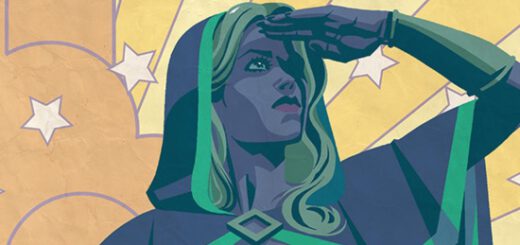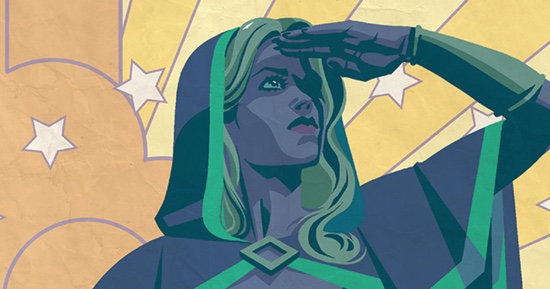Joe Corallo: The Paul Jenkins Interview
JC: Alters is a passion project of yours that you’ve wanted to pursue for over a decade. Could you talk about the genesis of the project and how it’s changed since its original conception?
PJ: Alters was conceived as a way to tell stories about “superheroes with disadvantages” when I was writing more often for DC and Marvel. I thought that would be a tremendous concept because we’d have people dealing with certain problems – at the time I was slightly more focused on things like physical disabilities – and they’d also have a sort of “super-advantage.” I thought that would be very fertile ground for interesting stories that were in my personal wheelhouse as a writer – very much about characterization and less about powers. Both DC and Marvel always expressed an interest but it’s tough to get new characters off the ground so it never got picked up.
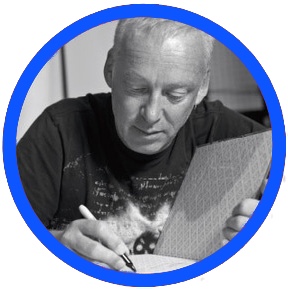 Over time I realized just how many stories there were to be told if I expanded a little more and dealt with different kinds of disadvantage. For example, I fractured my neck playing soccer years ago and have written many times about how hard that period of time was for me. I was indestructible right up until I got hurt, and then I dealt with post-concussion syndrome and very debilitating vertigo. So I am going to do a story about one of our Alters who will be stricken with vertigo every time their power manifests because that is interesting to me. I have stories about a homeless character, a person dealing with PTSD, a person who is bipolar, a person who is dealing with a form of superhero Alzheimer’s. The list goes on.
Over time I realized just how many stories there were to be told if I expanded a little more and dealt with different kinds of disadvantage. For example, I fractured my neck playing soccer years ago and have written many times about how hard that period of time was for me. I was indestructible right up until I got hurt, and then I dealt with post-concussion syndrome and very debilitating vertigo. So I am going to do a story about one of our Alters who will be stricken with vertigo every time their power manifests because that is interesting to me. I have stories about a homeless character, a person dealing with PTSD, a person who is bipolar, a person who is dealing with a form of superhero Alzheimer’s. The list goes on.
Despite the opening arc revolving around Chalice, our book is not intended to be the LGBT comic. It’s a comic that has a prominent trans character who will always be a focal point. Why? Because she kicks ass, and her story is interesting. I happen to think she’s going to be a very popular character because she seemed to have a good voice from the first time I wrote her into a script. We shall see how people react to her.
JC: You’ve stated before how diversity is important to you in terms of comic creators as well as their creations. As far as the creative team behind Alters goes, how involved were you in putting the team together or having input on how the team would be shaped?
PJ: I had a lot of input. This decision was guided in part by the initial loading screen in the video game Assassin’s Creed. They state that the game is developed by a team of many differing faiths and beliefs, and I loved that sentiment. I wanted our book to be created by a group of differing ages, genders and gender identities, ethnic backgrounds, you-name-it. With AfterShock, it was not something I had to fight for – they believed in that vision for the project immediately. But remember: this is a book that deals with many types of people so the diversity in our creative team is never going to cover the diversity of the characters.
JC: Though Chalice is a central character, we do know of at least a couple of other Atlers in the series have been mentioned. Could you describe to us the format of these stories? Will this be more of a team book or a shifting narrative?
PJ: I suppose “team book” is a good enough description. I’d probably compare it to the style of the Inhumans, which I wrote for Marvel in the late 90’s. Inhumans was a 12-issue maxi-series in which I’d highlight each character as the story unfolded. In Alters, we will sometimes tell single issue stories about one character or another. We may focus for another character for five issues or so. I happen to think Chalice will always be prominent but then again, so will a few other early characters. One is called Octavian – he’s able to access every portion of his brain, so he’s super-hyper-intelligent. He’ll be around for the duration, too.
We’ll meet new characters as new Alters come into being. There’s a lot of ground to cover, not to mention a number of villains.
JC: Was the idea always to have Chalice as the first character to be highlighted in the series once it got picked up by Aftershock? What ultimately guided that decision?
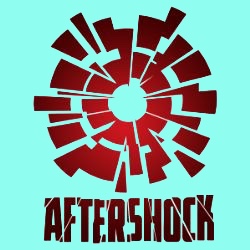 PJ: Well, I think so, yes. I think Chalice is very intriguing as a character because she has a compelling back story. We have a specific situation in mind for her that creates a sort of “ticking clock” tension from the first moment – she is transitioning but dealing with a tough family situation and is really struggling with how to tell her family. The family are beginning to see changes in her but as they see it, she is the middle brother of three. It’s going to be difficult. And just as she struggles with that transition, she discovers she is a powerful Alter and that changes everything.
PJ: Well, I think so, yes. I think Chalice is very intriguing as a character because she has a compelling back story. We have a specific situation in mind for her that creates a sort of “ticking clock” tension from the first moment – she is transitioning but dealing with a tough family situation and is really struggling with how to tell her family. The family are beginning to see changes in her but as they see it, she is the middle brother of three. It’s going to be difficult. And just as she struggles with that transition, she discovers she is a powerful Alter and that changes everything.
JC: Alters, and specifically Chalice, have gotten attention in media outlets including The New York Times and CBS News. What has the reception been towards Alters so far? How does this kind of media attention around a character like Chalice make you feel about the future of comics and expanding diversity in the medium?
PJ: The reaction has, for the most part, been very positive. I think the media are going to probably concentrate on the trans character because transgender has become a popular topic of late. But at the risk of repeating myself, Alters is a comic about many different people who are dealing with disadvantage, whether it be disability or marginalization. I’ve stated this clearly in every interview I have conducted. Chalice happens to be a central character and is featured in the first arc. She’s not the only character in the book. Now with that being said, I’m hopeful that the recent highlighting of transgender in the media will prove to be a positive thing, even if some aspects of the portrayals are negative. Every time we have a dialogue in our society, it helps to effect change. So if Alters simply adds to the dialogue, then that is a small positive.
JC: When creating and ultimately writing Chalice, how did you go about preparing for that? What kind of research did you do?
PJ: I make sure each script is read by at least three trans people who are helping me as consultants. I’m learning that there’s such complexity here that it’s going to take me a long time to really cover things in depth. And of course, people have very different experiences. There is no one way to write a character like Chalice – I can only try to be diligent in my research, and try not to write the obvious. I try not to take too much creative license, and to pay attention when people tell me that my character is doing something unrealistic. Remember, too, that our colorist Tamra Bonvillain is trans. She’s been really helpful, and I’m grateful that she understands I may or may not want the character to do certain things that drive the story. For example, it seems less likely in the scheme of things that a trans person might begin hormone therapy without first alerting their family. But I felt this conceit would help propel the story forward, and while it is unlikely it is at least conceivable (more on this below). I think it is really important that I concentrate on “story first.”
That is the common denominator of every single successful project I’ve ever been involved in. Someone recently told me that I must be a crusader in this endeavor, that by choosing to write about a trans character I have no choice. Well, I happen to disagree. My job is to tell a compelling story and by doing so, the crusade happens organically. If our book becomes preachy or out of touch, we’ll have failed. In order for our characters to feel rounded, they must not know everything, and they must sometimes make mistakes.
JC: In a book like Alters that will have characters of different backgrounds throughout, is a character like Chalice meant more to introduce the idea of a trans character to a cis comic audience that isn’t familiar with someone who is trans or to serve as a character that a queer and specifically trans audience can relate to?
The annoying answer here is “neither, and a bit of both.” As I stated above, my job is to try and write interesting stories about interesting characters. There is no perfect approach. If I write a treatise on my research about trans people then I might as well create a documentary. If Chalice is a kick ass character – and believe me, she is quite strong and powerful in our series so far – then we have a good book on our hands. Having written her, I like her. She’s trying to manage three lives. She has challenges. She’s not perfect but she’s pretty damned cool, and she has a strong will to succeed. She has compassion, especially for her less-than-perfect family. And she sees herself as a defender of persecuted Alters. So she’s more like Spider-Man or Wolverine, and less about some statement I have to make on transgender.
JC: The hook of “a young woman who can only really be herself…whenever she is not herself,” can lend itself to the tragic queer trope, where a character’s tragedy is directly caused by or linked to their queerness, and specifically their transness in this case. Do you feel that is part of Chalice’s story? As her creator, what does define her as a character?
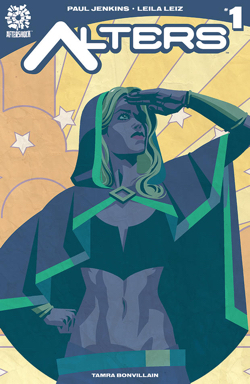 PJ: Okay, so… here I feel I have to take issue with your previous article a little bit. Your description of me as a “well-meaning cis ally” is intended to demonstrate that I don’t understand what I’m writing about, or that we are clearly going to bumble our way through this series with little to no idea of what we are doing. I did not write this book in an ill-considered way. I felt in your article you made this assumption, and glossed over the details because they did not fit your premise. I’m a writer trying to write good stories – that is the be all and end all of it.
PJ: Okay, so… here I feel I have to take issue with your previous article a little bit. Your description of me as a “well-meaning cis ally” is intended to demonstrate that I don’t understand what I’m writing about, or that we are clearly going to bumble our way through this series with little to no idea of what we are doing. I did not write this book in an ill-considered way. I felt in your article you made this assumption, and glossed over the details because they did not fit your premise. I’m a writer trying to write good stories – that is the be all and end all of it.
Here are a few things that we are not: we are not trying to be crusaders for the trans community. We are, however, featuring a trans character as the focus of our series. We are not inattentive to the difficulties faced by the trans community. But neither are we going to create a tool to educate people about transgender. Instead, by creating a cool, interesting premise (people dealing with disadvantage and hyper-advantage), we create a product that anyone can gravitate to. And if someone learns about or finds a new perspective on the subject of transgender, then that will be awesome. Some trans people have written to me to express their excitement about Chalice. Some have written to me to express their concerns, and I have tried my best to address those concerns and allay their fears. No story in history has ever been perfect, and we don’t expect to be. I readily acknowledge that Alters will never be able to mirror any individual’s personal experience. I hope the readers acknowledge that also.
So to answer your question directly: that particular hook occurs because of a story point, not some ill-advised tagline. Her “transness” does not make her tragic. Her family situation creates an issue which drives the story. Charlie, Chalice’s alter ego, is struggling with self-imposed pressure to keep her family unit intact. Her older brother, Teddy, is stricken with cerebral palsy and she worries that her transition will create added pressure on her parents. But she also knows that this is her time – that she must become outwardly who she really is. So she has begun her hormone therapy in secret, all the while knowing that puts her on the clock, so to speak. This may not be the perfect decision. It’s the one she has made, and she’s going to deal with the ramifications. And right in the middle of this, she suddenly becomes an Alter and must deal with a second type of transition. One may argue that this is outlandish, or unrealistic, or whatever. Newsflash: every superhero ever created is outlandish and unrealistic. So we’re in good company there. :)
JC: Chalice’s story appears to be linked to her transitioning and while this is happening, coincidence or not, she is gaining great power. Other stories in different media as well as in the news have used transitioning as shock value and to exploit the trans community for the purpose of entertainment and to feed an inappropriate curiosity. What makes Chalice’s story different?
PJ: I think part of the answer to this is covered above. I certainly understand your point, and have found some of the coverage appalling. Of course, the coverage of the U.S. election/Brexit/terrorism and just about everything else these days is equally appalling. I’m not going to agree that we are somehow taking advantage of trans people simply by writing a character who is trans, especially because we have other characters dealing with different issues and I haven’t heard you complain about us addressing bipolar disorder or the issues facing someone who is quadriplegic. Every single character in our book is presented for the purpose of entertainment, Chalice included. I am in the business of entertainment. But I happen to be a research fiend, and I’m always going to be worried that a trans reader will find my character unrealistic. I feel the same way when I am writing detective fiction – I hope that actual detectives would find my stories plausible, and I try to research them that way. I will take the same approach with our bipolar character, our homeless character, our PTSD characters and so on…
I hope what makes us different from those who would try to exploit the trans community is that we’re focused on story first, and have only a minor secondary agenda in terms of shining a light on various people who are dealing with disadvantage in our society. I think the diversity of our creative team helps. And I’d like to make it quite clear before anyone tries to find fault here that we are absolutely not equating transgender with, say, disability. Our series addresses people who are dealing with disadvantage. Being marginalized by society, misunderstood, bullied, harassed and exploited by the media certainly qualifies for being at a disadvantage. Other characters will have obvious physical disadvantages. Others may have less obvious disadvantages (such as the character with vertigo).
And this leads me to the other issue I had with your previous article – the complaint that this is yet another view of transgender through a cis lens, as if I am disqualified from writing a trans character. You casually mentioned that we do have a core team member who is trans but “that’s not a position with creative control in a narrative sense.” That is an assumption on your part. You don’t know Tamra’s input, so you can’t make that assumption. Now, we each have our jobs on the creative team and it’s not as though I have Leila or Tamra’s artistic expertise. And while you happen to be partly correct – as the writer I am the initial creator of the story – I happen to be a very collaborative writer, and always have been. It has stood me in good stead over the years I have been working in this industry. I invite input, and truly believe that comics are a collaborative medium.
To address the point: where would we be if we were forced to write only what we are? We’d be without Othello, for one thing because Shakespeare was hardly a black, Muslim dude from Venice. I would be forbidden to write people from different ethnic backgrounds than my own, and I would never be able to write a female character. The argument that this series must have a requisite trans writer is specious and absurd: I hope that trans writers create tons of material that will hit the mainstream. I hope a trans creator makes the next popular superhero character, and that no one gives a royal shit that they are trans or otherwise, as it should be. My audience is anyone who wants to read the book. If they happen to be trans I hope they like Alters, and feel we have done a halfway decent job with the trans character, especially.
I’m not one to pay lip service to things – I do understand your concerns and any concerns of the LGBT community who are worried that Chalice is being created in part by some middle-aged straight white guy. I hope (and believe) that we are doing our best to address those concerns. The work should be judged for what it is, not pre-judged for who is creating it.
JC: I want to thank you again for talking with me about your new comic, Alters, being published by Aftershock Comics starting September 7th. What’s the best way for people to follow the release of Alters, spread the word, and discuss the comic?
PJ: My pleasure, Joe. Thanks for giving me a chance to respond. Support your local comic store, and follow AfterShock and our creative team on Twitter and Facebook. Wish our book luck, and please buy lots of copies!

